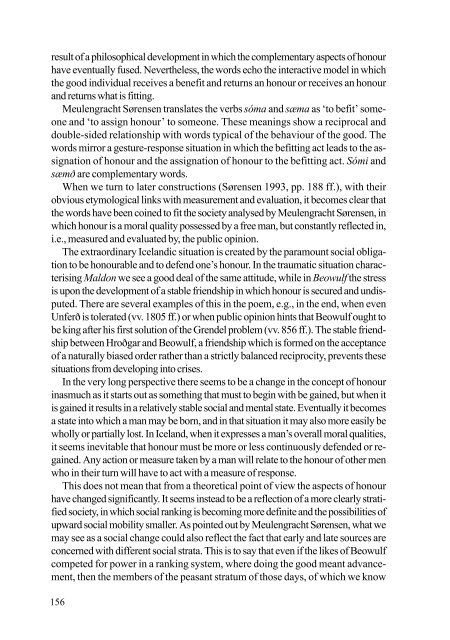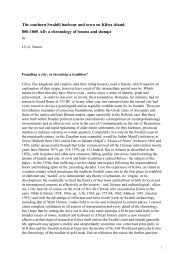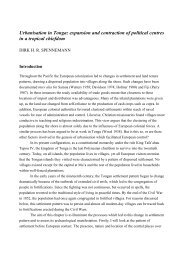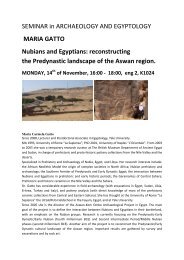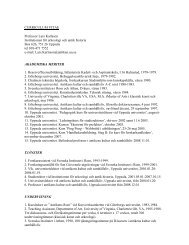Beowulf - Institutionen för arkeologi och antik historia
Beowulf - Institutionen för arkeologi och antik historia
Beowulf - Institutionen för arkeologi och antik historia
You also want an ePaper? Increase the reach of your titles
YUMPU automatically turns print PDFs into web optimized ePapers that Google loves.
esult of a philosophical development in which the complementary aspects of honour<br />
have eventually fused. Nevertheless, the words echo the interactive model in which<br />
the good individual receives a benefit and returns an honour or receives an honour<br />
and returns what is fitting.<br />
Meulengracht Sørensen translates the verbs sóma and sæma as ‘to befit’ someone<br />
and ‘to assign honour’ to someone. These meanings show a reciprocal and<br />
double-sided relationship with words typical of the behaviour of the good. The<br />
words mirror a gesture-response situation in which the befitting act leads to the assignation<br />
of honour and the assignation of honour to the befitting act. Sómi and<br />
sæmð are complementary words.<br />
When we turn to later constructions (Sørensen 1993, pp. 188 ff.), with their<br />
obvious etymological links with measurement and evaluation, it becomes clear that<br />
the words have been coined to fit the society analysed by Meulengracht Sørensen, in<br />
which honour is a moral quality possessed by a free man, but constantly reflected in,<br />
i.e., measured and evaluated by, the public opinion.<br />
The extraordinary Icelandic situation is created by the paramount social obligation<br />
to be honourable and to defend one’s honour. In the traumatic situation characterising<br />
Maldon we see a good deal of the same attitude, while in <strong>Beowulf</strong> the stress<br />
is upon the development of a stable friendship in which honour is secured and undisputed.<br />
There are several examples of this in the poem, e.g., in the end, when even<br />
Unferð is tolerated (vv. 1805 ff.) or when public opinion hints that <strong>Beowulf</strong> ought to<br />
be king after his first solution of the Grendel problem (vv. 856 ff.). The stable friendship<br />
between Hroðgar and <strong>Beowulf</strong>, a friendship which is formed on the acceptance<br />
of a naturally biased order rather than a strictly balanced reciprocity, prevents these<br />
situations from developing into crises.<br />
In the very long perspective there seems to be a change in the concept of honour<br />
inasmuch as it starts out as something that must to begin with be gained, but when it<br />
is gained it results in a relatively stable social and mental state. Eventually it becomes<br />
a state into which a man may be born, and in that situation it may also more easily be<br />
wholly or partially lost. In Iceland, when it expresses a man’s overall moral qualities,<br />
it seems inevitable that honour must be more or less continuously defended or regained.<br />
Any action or measure taken by a man will relate to the honour of other men<br />
who in their turn will have to act with a measure of response.<br />
This does not mean that from a theoretical point of view the aspects of honour<br />
have changed significantly. It seems instead to be a reflection of a more clearly stratified<br />
society, in which social ranking is becoming more definite and the possibilities of<br />
upward social mobility smaller. As pointed out by Meulengracht Sørensen, what we<br />
may see as a social change could also reflect the fact that early and late sources are<br />
concerned with different social strata. This is to say that even if the likes of <strong>Beowulf</strong><br />
competed for power in a ranking system, where doing the good meant advancement,<br />
then the members of the peasant stratum of those days, of which we know<br />
156


